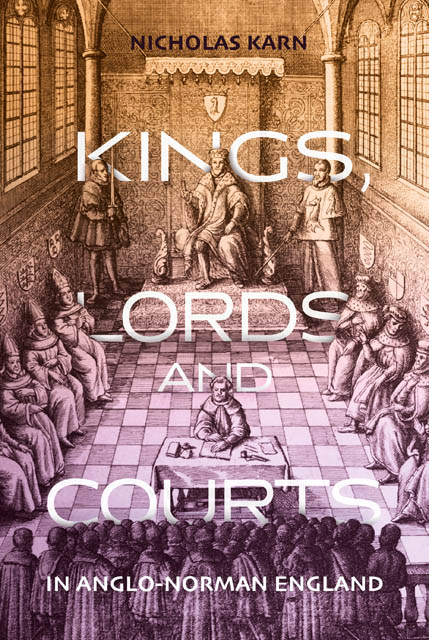Book contents
- Frontmatter
- Dedication
- Contents
- Preface and Acknowledgements
- List of Abbreviations
- Introduction
- 1 Lords and their Dependents in Court: The Later Anglo-Saxon Paradigm
- 2 The Aspirations of Lords in Eleventh- and Twelfth-Century England
- 3 Private Claims and Hundreds in the Later Eleventh and Earlier Twelfth Centuries
- 4 The Division of Hundreds and the Proliferation of Courts
- 5 From Debate within Courts to Debate between Courts: The Origins of Jurisdictional Debate
- 6 Courts, Pleas and Kings in the Early Twelfth Century
- 7 Pleas and Justices in the Early Twelfth Century
- Conclusion
- Appendix: The Evidence for Justices, 1100–54
- Bibliography
- Index
Appendix: The Evidence for Justices, 1100–54
Published online by Cambridge University Press: 18 January 2023
- Frontmatter
- Dedication
- Contents
- Preface and Acknowledgements
- List of Abbreviations
- Introduction
- 1 Lords and their Dependents in Court: The Later Anglo-Saxon Paradigm
- 2 The Aspirations of Lords in Eleventh- and Twelfth-Century England
- 3 Private Claims and Hundreds in the Later Eleventh and Earlier Twelfth Centuries
- 4 The Division of Hundreds and the Proliferation of Courts
- 5 From Debate within Courts to Debate between Courts: The Origins of Jurisdictional Debate
- 6 Courts, Pleas and Kings in the Early Twelfth Century
- 7 Pleas and Justices in the Early Twelfth Century
- Conclusion
- Appendix: The Evidence for Justices, 1100–54
- Bibliography
- Index
Summary
The evidence for justices is scattered and diffuse, at least before the survival of consistent and relevant evidence from the last years of the twelfth century onward. It has never been brought together as rigorously as the evidence for sheriffs, and this has meant that justices as a whole have been understood much less thoroughly than sheriffs. There have been four modern exercises in listing justices for the period in question, but all are incomplete. The first was by Doris Stenton, and this was part of a larger exercise in tracing justices into the early thirteenth century. She based its contents on the kinds of sources which were of most importance for the thirteenth century, but carried those choices back into the early twelfth century. So, she discussed Anglo-Norman justices solely on the basis of the Pipe Roll for 1129–30, which meant that she could only cover a small part of the first half of the twelfth century, passed by other and more abundant kinds of evidence, and glossed over the simple ambiguity of so many entries in that Pipe Roll. A similar approach was followed in the list of justices by Warren Hollister. This again is based on the Pipe Roll for 1129–30, but Hollister supplemented the data because there are obvious gaps and missing segments in that Pipe Roll; for instance, he noted that there is no account for Shropshire there, and suggested that Payn fitz John might have acted as justice in that shire. His supplementary conjectures are plausible, and some are corroborated below, but he does not explain the basis for them. He seems to assume that only those known at the king’s court could have been justices. The third and fourth lists by Susan Reynolds, and by Christopher Brooke and Gillian Keir, covered the justices of London alone. They make use of a fuller range of sources, and draw extensively on royal and other charters to make these lists. They are the most successful list of justices hitherto published, though they are necessarily limited in geographical scope.
The lists below respond to the advantages and shortcomings of the previous lists, and to some of the ideas about justices set out in Chapter 7 above. In terms of sources, two of the lists are based overwhelmingly on charters, especially royal charters, and sideline the evidence of the Pipe Roll.
- Type
- Chapter
- Information
- Kings, Lords and Courts in Anglo-Norman England , pp. 208 - 229Publisher: Boydell & BrewerPrint publication year: 2020



